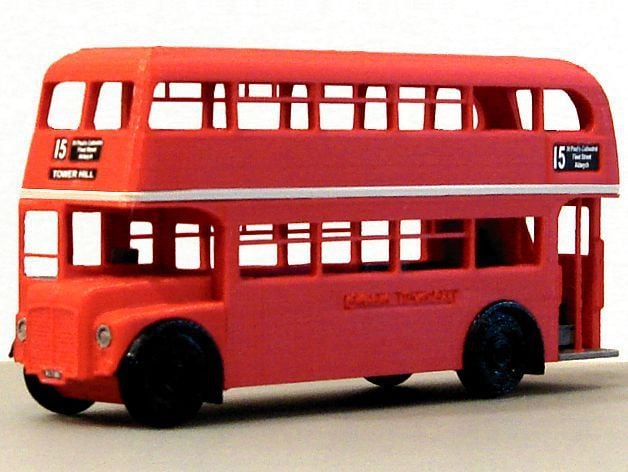
London Bus
thingiverse
The model is based on the iconic Routemaster bus, a symbol of British culture that was in service from 1956 to 2005. A modern version of this classic design entered service in 2012. You will need to print the following parts: * 2 axles * 4 wheels * 2 front mudguards * 2 rear mudguards * 2 headlights And one copy of all other parts. I used a combination of True Red, True Black, Cool Grey, and Warm Grey filaments for printing. On my Makerbot Replicator+, I printed multiple pieces simultaneously at the default settings of 10% infill and 0.2mm layer height using rafts but no supports. All parts should be printed in the orientation shown. The assembled model can be secured permanently with a few drops of Super Glue. Route signs and number plates are printed on thin card stock, cut out, and glued into position. The attached files contain the signs you will need to print. Assembling the Model: Trim any excess filament threads. Glue the trim to the bottom of the top deck, ensuring it fits flush at all sides. Secure the top floor seats into the top deck and trim, making sure the bottom is flush with the trim's bottom edge. Fix the lower floor seats into the lower deck, verifying that the grab pole at the back fits into its socket in the floor. Insert the stairs from the top, securing them into position. Glue the assembled top deck to the assembled bottom deck. Secure the driving wheel into its socket in front of the driver's seat. Tilt it slightly towards the driver. Place the (slightly wider) front mudguards into position, ensuring they are pushed fully into the grooves designed for them under the driver's cabin. Note that the rear ends of the mudguards taper while the front ends are cut square, and the front ends fit flush but the tapering rear ends extend slightly below the bus sides. Glue the two headlights into their sockets, using tweezers if necessary. Attach one wheel to an axle, insert the axle through the hole beneath the driver's cabin, and glue the other end into another wheel, ensuring no glue gets onto the side of the axle. This would prevent it from turning. Secure the (slightly narrower) rear mudguards into position beneath the lower deck, applying the same note about correct alignment as with the front mudguards. Fix the rear wheels and axles into position similarly to the front wheels. Glue the assembled driver's cabin into position at the front of the bus, fitting it flush with the trim at the front and sides. Cut out the printed route signs and number plates, gluing them into position. Approximate Dimensions: * Length: 16cm * Width: 4.5cm * Height: 7cm Estimated Printing Times: * Lower deck: 2h 34m (True Red filament) * Top deck: 2h 21m (True Red filament) * Driver's cabin: 16m (True Red filament) * Trim: 39m (Warm Grey filament) * Lower floor seats: 1h 39m (Cool Grey filament) * Top floor seats: 1h 33m (Cool Grey filament) * Stairs: 23m (Cool Grey filament) * Driver's seat and headlights: 16m (Cool Grey filament) * Mudguards and driving wheel: 21m (True Black filament) * Wheels and axles: 56m (True Black filament) Visit my designs on Thingiverse at https://www.thingiverse.com/Winslow/designs for more creations.
With this file you will be able to print London Bus with your 3D printer. Click on the button and save the file on your computer to work, edit or customize your design. You can also find more 3D designs for printers on London Bus.
